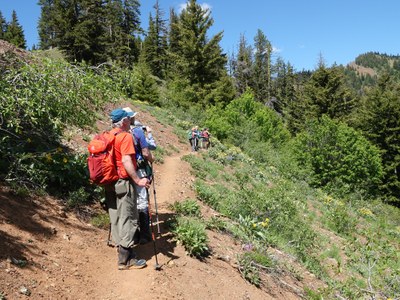
Naturalist Course
Introduction to the Natural World Course
An introductory course for the outdoors people interested in learning more about the natural world they are exploring.
- Thu, Apr 6, 2023 - Sat, Sep 30, 2023
- Committee: Seattle Naturalists Committee
- Members: $195.00 Guests: $235.00
- Availability: FULL, 9 on waitlist (106 capacity)
- Cancellation & Refund Policy
The Introduction to the Natural World course is designed for hikers, climbers, photographers, scramblers, and conservationists who want to learn more about the mountains, trails and parks they enjoy. Using information from the lectures, homework and various smartphone apps, charts, and guidebooks, you will learn some basic ecological concepts and geologic principles, some natural history, and how to identify flowers, shrubs, trees, birds, tidal creatures, butterflies and other forms of life found in the Pacific Northwest. Instructors are volunteers, eager to share their knowledge and enthusiasm for nature. Field trips will be organized with a mix of terrains and distances to accommodate most fitness levels.
The course includes four required lecture evenings that are two hours each, given online in zoom format, not at the Seattle Program Center. They will be recorded for each of the four sessions. Approximately an hour of homework will be required in preparation for the course and there will be ECOregion (or GEOregion) videos to watch prior to each of the four field trips. Some short quizzes and homework assignments will help reinforce the lecture material, give you some practice and prepare you for the field trips. We generally offer two local field trips and two in the mountains. The local field trips are about 3-4 hours long, during the day or the evening, and attendance is required for graduation. The mountain trips are highly encouraged but not required. These will be a full day, including travel, and may take place in the Teanaway region, the shrub-steppe of Eastern Washington and in Mount Rainier or Mount Baker National Park. Field trips will be posted after each lecture. Due to differing dates of flowers in bloom each year, we have to wait until a few weeks before the later field trips, which happen in June and July, to post them. We try to offer a variety of trips on weekends and weekdays to accommodate varying schedules. Each student will track progress on completing course assignments and attendance using Google Classroom.
The naturalist group has also compiled a number of Resources and "Taking it Further" study guides for participants who wish to go beyond the basics and get more practice, and these will be available in Google Classroom.
New this year: An optional Meet-and-Greet session will take place Sunday morning, April 2 for students and instructors, at the Seattle Program Center at Magnuson Park. (RSVP link)
The Course goal is to have fun, meet some like-minded folks, and to learn!
Then join your fellow students and instructors to celebrate your success at a potluck in September, date TBD.
Session 1. April 6, 2023 7-9pm
Abiotic gradients & Succession (or Disturbance)
- Ferns
- Trees
Lowland Forest ECOregion
FTs in local parks
Session 2. May 4, 2023 7-9pm
Life History Strategies / Reproduction
- Forbs and Shrubs
- Birds & Migration
Shrub Steppe ECOregion
FTs in local parks, birding; or shrub-steppe
Session 3. June 1, 2023 7-9pm
Interactions & Food Webs
- Insects and Butterflies
- Intertidal zone
Teanaway GEOregion
FTs in Eastern Washington, Teanaway, Swauk Pass, beaches at low tide
Session 4. July 6, 2023 7-9pm
Habitat size & Nutrients
- Mushrooms
- Geology
- Summary INW
Alpine ECOregion
FTs in alpine areas
This course is for adults only, please.
Badges you will earn:
This course has no scheduled activities.
A smartphone to use free apps. Binoculars and a loupe (magnifying glass) are recommended but not required.
You must register for this course to see course materials.


 Introduction to the Natural World
Introduction to the Natural World
 Basic Plant Identification
Basic Plant Identification
 Basic Tree Identification
Basic Tree Identification
 Basic Bird Identification
Basic Bird Identification